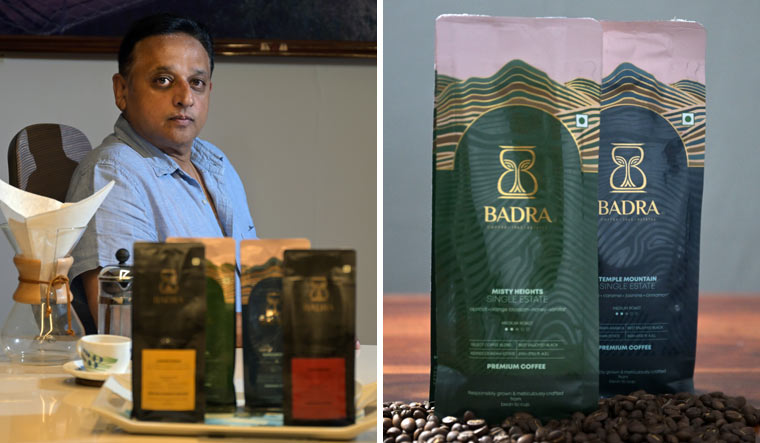Do you like your coffee? Or do you just drink it out of habit? If your answer is ‘yes’ to the second question, Jacob Mammen, managing director of Badra Estates in Chikkamagaluru in Karnataka might have a solution for you.
Badra Coffee is all set to launch four blends for the retail market. Three of them, Temple Mountain (Arabica), Misty Heights (single estate) and Kaapi Nirvana (filter), are pure coffees, while Dakshin Fusion is a filter coffee with chicory. “Explore a basket of flavours direct from our farm, grown, roasted and curated by us available soon,” says Mammen. These will soon be available to the Indian consumers.
Mammen’s great-grandfather bought the estate from Brooke Bond Ltd. Three generations of the family have run Badra Estates and Industries Ltd, which was formed in 1943. “Things were quite different in the beginning. The Coffee market was fully regulated. All growers pooled their coffee with the Coffee Board of India. We had no control after coffee left the farm,” says Mammen. In 1997, the government allowed growers to sell their coffee. Badra started exploring export possibilities then, and has been focusing on specialty coffee ever since.
Mammen is a true believer in developing specialty coffee, and he worked with reputable international buyers to improve the quality of Badra Coffee. “We call it relationship coffees,” he says. “We interact with our buyers to understand their requirements of different flavour profiles, and then work on developing coffees that specifically suit them.”
Special attention is also given to manufacturing, which involves washed, semi-washed, and unwashed processes. The company has done different trials in fermentation and has been working with a German buyer who collaborates with the German government. Scientists from Germany come to the farm during harvest. They collect samples after many trials. The samples are then taken to their labs in Berlin where they isolate the beneficial microbes prevalent on different estates. These microbes are then used to tweak fermentation and produce a basket of flavours.
The focus on collaboration has led to a range of coffees that could be as wide as what is available in the wine industry. Climate, altitude, soil, farming methods, plant varieties and microclimate all play a role in developing flavour. In general, Indian coffees are of medium acidity, which is very good for an espresso.
Taste is everything in the specialty coffee market. Badra Coffee sells coffee based on taste and flavour. The company’s experts tailor-make coffees to customer requirements. “Every process, from bean to cup, affects the taste of coffee. All processes from growing to roasting are handled in-house and not outsourced,” says Mammen.
India is just one of the many markets that international buyers shop from. “Usually our customers are roasters and they buy from all over the world,” says Mammen. “As a seller, we must know what buyers are looking for in our coffees. So we must understand whether they are looking for espresso, stand-alone, filter, blend or any other special taste characteristics. They interact with us and cup coffees to find out what matches their requirements.” Badra Coffee mainly sells to niche coffee roasters in Japan, South Korea, Thailand, Malaysia, Germany, Italy, the UK, Norway, Greece and the US.
Over the years, however, the coffee industry in India has changed dramatically. Climate change and labour issues have posed new and difficult challenges for growers. On the positive side of the spectrum, coffee consumption and consumer interest in coffee have drastically increased. As a result, Badra Coffee has now decided to move beyond relationship coffees as the Indian consumer is asking for more.
“The Indian coffee market has evolved a lot,” says Mammen. “With Indian consumers becoming increasingly discerning, they now seek detailed information about the origin and flavours of their coffee. In response to this demand, we offer both roasted beans and ground coffee tailored to customer requirements. This is the opportunity to move to the next level of the roast and the ground segment.”
The domestic special and specialty coffee market is still small but growing. Mammen gives the credit for this growth to Cafe Coffee Day, which set up coffee outlets all over this tea-drinking country. “Of late, with so many people popularising coffee, young people are now very interested in it,” he says.
This is the first time Badra Coffee is selling a finished product to retail customers. “We are in total control of our coffees. We are a seed-to-cup company. So if you are looking to savour every sip of your coffee rather than just drink it out of habit, give some of Badra Coffee’s blends a try for a truly sensational bean-to-cup experience,” says Mammen.


